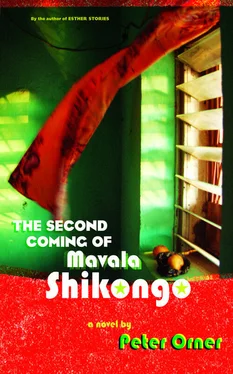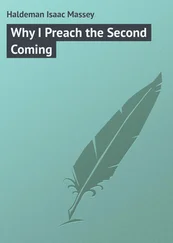He slept on a cot in the mission garage. His bed was always neatly made with a single blanket. I never saw a pillow on it. He kept his second pair of boots under the bed, along with a cardboard box where he stored the clothes he wasn’t wearing. There was also, sometimes, a shadow made by his bed that stretched across the oily pavement of the garage, depending on the time of day and the angle of the sun coming in through the cracked windows.
Every third Saturday of the month, Theofilus would leave the farm and its cattle and goats in the charge of two Standard Sevens and take a donkey cart to visit his wife. She was attached to a farm near Wilhelmstal, halfway to Okahandja. It was said she couldn’t move out to Goas and live with Theofilus because keeping a wife didn’t come with his job. Once a month, he ironed his suit and white shirt on an old unused door held up by two upturned paint cans. Once a month, his tattered blue jumper swung in the wind on the line behind the garage, waiting for him to put it on again Monday morning.
The boys were having a soccer tournament that Saturday, so we were out there on the sidelines, sitting on desks we’d dragged from our classrooms, watching and betting on teams. Bufula Bufula were 2 to 1 over Pepsi All-African Stars, 8 to 1 over Omaruru Toyota. (Pohamba’s odds.)
Theofilus on his donkey cart in a pressed black suit and shined shoes. He was all hitched up, the cart standing near the far goal, in front of the mission garage. The unfair thing was, he had always been kind to them, never beat them at all, much less very hard, and he never picked on the lazier of the two, a nameless grizzle-haired black and brown who often let his friend, a gray shaggy named Oom Zak, carry most of the weight. He fed those two donkeys more carrots than they could eat. It was as though they’d talked it over and decided that day to go on strike, Theofilus and his mercy be damned. We could see, from our seats on the other side of the field, that he at first considered it an aberration. He beat them a few times, gently. Still, they wouldn’t budge. He beat them harder. Nothing. We watched him look curiously at the stick, as if it were the problem. Then Theofilus raised the stick over his head and calmly began to flog them.
He kept at it.
Finally, even the boys noticed and stopped the game to watch Theofilus crack those donkeys so hard and for so long that we could see the blood of the lazy nameless one flicking off the stick. The whole time he stared straight ahead, like none of this was happening, as if the whole farm weren’t watching. A man on his way to see his wife but not going anywhere. His long legs at perfect right angles, so that they looked, from where we all were sitting, like a solid table. We all watched — the teachers and the boys. Him pretending it wasn’t happening, even as the blood began to splatter his clean suit, and still those two stood motionless, as if today they were no longer farm donkeys but dignified statues of their supposed cousins, horses.
Theofilus straddled up there in his best now-ruined clothes. There was something almost obscene about how we couldn’t take our eyes off it. It was Mavala Shikongo who finally said something. She was sitting with that baby, Tomo, clawing around, biting her ankles. She’d begun to join us. Tomo had come first. He couldn’t be contained in that little room that used to be the principal’s garage. And Mavala had followed. What else was there to do at Goas, ultimately, but join us?
She gets him a day a month?
I didn’t hear it when she said it. Do you know what I mean? At first, you don’t hear something, and then you play it back in your head and you hear it perfectly?
She didn’t say anything else. Still, she shamed us. We hadn’t thought of his wife. Maybe we figured we didn’t need to. We’d seen so many like her, old mammies walking along the goat paths that ran beside the tar roads, scarves wrapped tight around their heads. Why be more specific?
Theofilus didn’t break the bastard stick across his knees. He set it down on the floor of the cart like it was made of glass. He looked exhausted, as if he really had gone to her and come back. His pale, sun-ravaged face. He got off the cart and unbuckled the harnesses the same gentle way he always did. Then he walked to the mission garage and hoisted the door and went inside. The boy who had been closest to the cart, the keeper, Skinny Hilunda, walked up and gave the donkeys a few punches in their flanks. They didn’t notice. Later, both of them wandered away to the veld, because they felt like wandering away to the veld. Theofilus didn’t work that day. He didn’t come out of the garage. And we sat by the soccer field and thought of her watching the road he wouldn’t come home on, wondering if somehow after all these years she had got the wrong Saturday. Are you next week, Theo? Always she hears him before she sees him. The axles beneath the cart shriek, and if there’s no wind, she can practically hear him from as far as Vogelslang — then him coming into view over a rise in the highway.
Part Two. FARTHER INTO THE VELD
God preserve me from love.
— BESSIE HEAD
Summer or whatever you called that even hotter time before summer even started when your skin wasn’t used to the night heat yet and the mosquitoes began their bloodlusty moaning. How their noise changed as the night went deeper. At the beginning of the night they were feverish because of the unbearably beautiful proximity of your flesh, and yet the netting and the coils worked for the most part and the lust changed to frustration and you’d listen to their hunger for you rise and dissipate, rise and dissipate, until you sank into a sort of stupor that didn’t feel like sleeping, though you woke up in the morning and realized you had slept, that it hadn’t all been a waiting. And in the morning, the hopeful ones, the hangers-on, were so drowsy from unrequited aching outside the net they were simple to kill, so on hot mornings you’d hear, from every room in the singles quarters, the sound of joyous acrobatic whacking, easy rolled-newspaper slaughter, even from Vilho’s, all that love-thy-neighbor talk and he was as much mass murderer as we were, and then we’d show off the carnage on our walls, give each other mini-tours of death, Got this fucker with my pinkie, all the flat black asterisks, and the lucky ones also, the ones sated with our blood, them massacred now too, us thinking we’ve reaped our revenge, always forgetting that tonight our victories will mean nothing, that they’ll all be reborn, reincarnated fifty, a hundred, a thousand times, and that killing them will always be the same as not killing them.
Spacious days yawned on. We put off everything we had to do, because there would always be time for it later. This afternoon was tomorrow. Night was Madagascar. We’d stand before our classes and say words, slowly, languidly, words. It was as if we were talking under water. These were days Pohamba couldn’t contain himself. He was sweating for it, working long hours of love, going to Karibib every chance he got (hitching rides, taking Festus’s bike), and straggling back to Goas at sunrise and not changing his clothes for school, just appearing in the staff room for morning meeting with enormous ovals of sweat staining his silken armpits. Even the principal respected Pohamba’s work ethic and didn’t ride the Good Book too hard on him.
He’d often run out of money. Only Vilho would still give him any. That saint would look at him with his sad, empathetic eyes and stick the rands in Pohamba’s pocket like a bouquet. And still Pohamba would feel the need to explain it: “Can’t be a sugar daddy without any sugar, hey?”
Читать дальше












